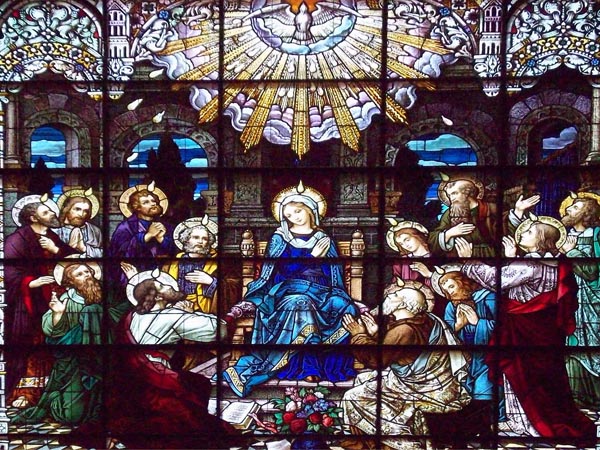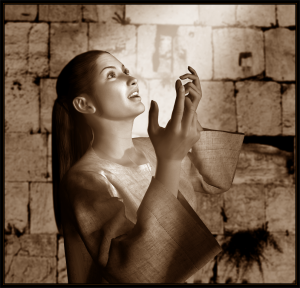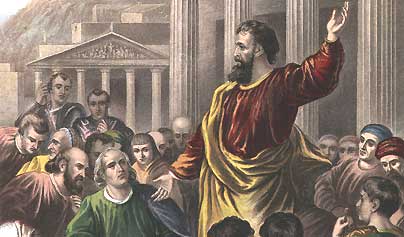My point is that the NT is not the prime source for determining a divine truth which you claimed. And I explained how it isn't. I doubt you even read my post.
I thought we were discussing the Church's belief in Mary being sinless.
No earlier than the 13th century? Perhaps you should take the time to read what the Fathers and the Doctors of the Church wrote by the 13th century instead of only reading the Bible which doesn't do much good on its own. .
That is absolute nonsense. Prior to the 3rd century we don't have any extant writings on the PVM in the apologetic works of the ECFs because the doctrine wasn't a contentious issue with heretics at the time.
I have provided historic citations in other threads concerning the PVM. What you're referring to is Mary's virginity during the birth of Jesus, which is connected to Mary being sinless and Eve's anti-type. But the virginitas in partu does presuppose the virginitas post partem. Mary is the gate that points eastward. Here are a few samples.
But the pious confession of the believer is that, with a view to our salvation, . . . the Creator of all things incorporated with Himself a rational soul and a sensible body from the all-holy Mary, ever-virgin, by an undefiled conception, without conversion, and was made man in nature, but separate from wickedness: the same was perfect God, and the same was perfect man; the same was in nature at once perfect God and man."
St. Hippolytus,Against Beron and Helix, Frag VIII [c. A.D.210]
The Book [the Protoevangelium] of James [records] that the brethren of Jesus were sons of Joseph by a former wife, whom he married before Mary. Now those who say so wish to preserve the honor of Mary in virginity to the end, so that body of hers which was appointed to minister to the Word . . . might not know intercourse with a man after the Holy Spirit came into her and the power from on high overshadowed her. And I think it in harmony with reason that Jesus was the first fruit among men of the purity which consists in [perpetual] chastity, and Mary was among women. For it were not pious to ascribe to any other than to her the first fruit of virginity.
Origen, Commentary on Matthew 2:17 [A.D. 248]
13. "The Holy Virgin is herself both an honourable temple of God and a shrine made pure, and a golden altar of whole burnt offerings. By reason of her surpassing purity [she is] the Divine incense of oblation ( = προθέσεως),and oil of the holy grace, and a precious vase bearing in itself the true nard; [yea and] the priestly diadem revealing the good pleasure of God, whom she alone approacheth holy in body and soul. [She is] the door which looks eastward, and by the comings in and goings forth the whole earth is illuminated. The fertile olive from which the Holy Spirit took the fleshly slip (or twig) of the Lord, and saved the suffering race of men. She is the boast of virgins, and the joy of mothers; the declaration of archangels, even as it was spoken: "Be thou glad and rejoice, the Lord with thee"; and again, "from thee"; in order that He may make new once more the dead through sin.
14. "Thou didst allow her to remain a virgin, and wast pleased, O Lord, to lie in the Virgin's womb, sending in advance the archangel to announce it [to her]. But he from above, from the ineffable hosts, came unto Mary, and first heralded to her the tidings: "Be thou glad and rejoice." And he also added, "The Lord with thee. Blessed art thou among women, and blessed is the fruit of thy womb." But she was in tumult, and pondered in her mind what sort of tidings was this. But then in seemly fashion, I ween, the grace chose out the Holy Virgin; for she was wise in all ways, nor was there her like among women of all nations."
St. Gregory Thaumaturgas, Homily Concerning the Holy Mother of God [ d. A.D. 270]
"[T]hey [those engaged in the public transport service] came to the church of the most blessed Mother of God, and Ever-Virgin Mary, which, as we began to say, he had constructed in the western quarter, in a suburb, for a cemetery of the martyrs."
St. Peter of Alexandria, "The Genuine Acts of St. Peter of Alexandria," [c. 305 A.D.]
"If they [the brethren of the Lord] had been Mary’s sons and not those taken from Joseph’s former marriage, she would never have been given over in the moment of the passion [crucifixion] to the apostle John as his mother, the Lord saying to each, ‘Woman, behold your son,’ and to John, ‘Behold your mother’ (John 19:26–27), as he bequeathed filial love to a disciple as a consolation to the one desolate"
St. Hilary of Potiers, Commentary on Matthew 1:4 [A.D. 354]
"Let those, therefore, who deny that the Son is by nature from the Father and proper to his essence deny also that he took true human flesh from the ever-virgin Mary."
St. Athanasius, "Discourses Against the Arians," [c. 360 A.D.]
"Some dare to claim that Mary became fully Joseph's wife after the Savior's birth. How could she who was the dwelling-place of the Spirit, who was overshadowed by the divine power, ever become the wife of a mortal and bear children in pain, according to the ancient curse? It is through Mary, "blessed among women," that the curses uttered in the beginning have been removed according to which a child in such torments cannot be called blessed. Just as the Lord entered through all closed doors, so he came out if an original womb, for this virgin bore him truly and really without pain."
St. Ephrem of Syria, Nisibene Hymns (Hymn Against Heresies) [A.D. 361]
"The seedless birth of Christ can and could be denied only by those who deny the Gospel, whereas the Church of Christ from of old confesses Christ incarnate of the Holy Spirit and the Virgin Mary." But the birth of God from the Ever-Virgin was a stumbling stone for those who wished to call themselves Christians but did not wish to humble themselves in mind and be zealous for purity of life. The pure life of Mary was a reproach for those who were impure also in their thoughts. So as to show themselves Christians, they did not dare to deny that Christ was born of a Virgin, but they began to affirm that Mary remained a virgin only until she brought forth her first-born son, Jesus (Matt. 1:25)."
St. John Chrysostom, Homily 5 on the Gospel of Matthew [A.D. 370]
"And to holy Mary, [the title] 'Virgin' is invariably added, for that holy woman remains undefiled."
St. Epiphanius of Salamis, "Medicine Chest Against All Heresies," [c. 375 A.D.]
"Come, then, and search out your sheep, not through your servants or hired men, but do it yourself. Lift me up bodily and in the flesh, which is fallen in Adam. Lift me up not from Sara but from Mary, a virgin not only undefiled but a virgin whom grace had made inviolate, free of every stain of sin."
St. Ambrose, "Commentary on Psalm 118," [c. 387 A.D.]
The friends of Christ do not tolerate hearing that the Mother of God ever ceased to be a virgin"
St. Basil, Homily In Sanctum Christi generationem, 5 [ante A.D. 379]
"It helps us to understand the terms ‘first-born’ and ‘only-begotten’ when the Evangelist tells that Mary remained a virgin ‘until she brought forth her first-born son’ [Matt. 1:25]; for neither did Mary, who is to be honored and praised above all others, marry anyone else, nor did she ever become the Mother of anyone else, but even after childbirth she remained always and forever an immaculate virgin"
Didymus the Blind, The Trinity 3:4 [A.D. 386]
"You had good reason to be horrified at the thought that another birth might issue from the same virginal womb from which Christ was born according to the flesh. For the Lord Jesus would never have chosen to be born of a virgin if he had ever judged that she would be so incontinent as to contaminate with the seed of human intercourse the birthplace of the Lord's body, that court of the eternal king."
Pope St. Siricius, "Letter to Bishop Anysius," [c. 392 A.D.]
"In being born of a Virgin who chose to remain a Virgin even before she knew who was to be born of her, Christ wanted to approve virginity rather than to impose it. And he wanted virginity to be of free choice even in that woman in whom he took upon himself the form of a slave... "That one woman is both mother and virgin, not in spirit only but even in body. In spirit she is mother, not of our head, who is our Savior himself--of whom, even herself, all are rightly called children of the bridegroom--but plainly she is the mother of us who are his members, because by love she has cooperated so that the faithful, who are the members of that head, might be born in the Church. In body, indeed, she is the mother of that very head."
St. Augustine of Hippo, "Holy Virginity," [c. 401 A.D.]
"His [Christ's] origin is different, but his [human] nature is the same. Human usage and custom were lacking, but by divine power a Virgin conceived, a Virgin bore, and a Virgin she remained."
Pope St. Leo the Great, "Sermon 22," [c. 450 A.D.]
Shall I go on until the 13th century? Gee, I didn't even cite Jerome in his contention with Helvidius. I've met Protestants who claimed that the PVM "theory" started with him. Ignorance is bliss.

PAX

We have a difference of opinion regarding the nature of historical documentation. Primary documentation of any historical event comes from eyewitnesses. Secondary documentation comes from individuals who heard it from eyewitnesses. Tertiary documentation comes from those who heard it from secondary sources. There is no doubt in my mind that primary documentation is the best form of documentation, especially when the primary sources have been thoroughly vetted and authenticated.
You will agree, I believe, that an essential aspect, according to modern Catholic dogma, of Mary's sinlessness is her perpetual virginity. If, for one reason or another, her virginity was lost then she would no longer be sinless.
As we have seen, several of the ECF's took the position that Mary lost her virginity when she gave birth to Jesus Christ. I will ask you which position you hold concerning the birth of Jesus Christ. Do you believe that he mysteriously emerged from the side of Mary, leaving his umbilical cord, placenta, and Mary's hymen intact, thus preserving her virginity? Or, do you believe that Jesus Christ came into this world through the means of natural birth, which means that Mary's hymen was then broken, and her virginity was lost forever?
Upvote
0





